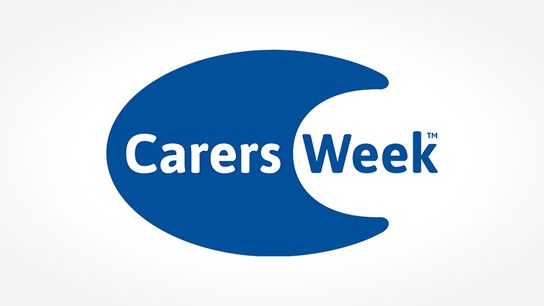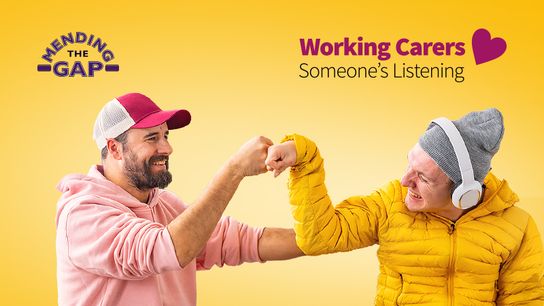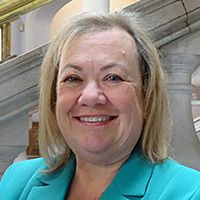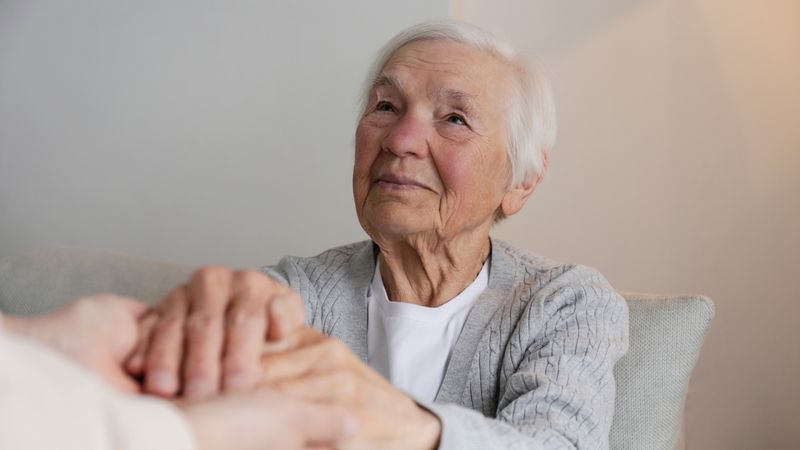Becoming an unpaid carer can often be sudden. A carer’s role can make paid work, study, maintaining social connections and getting involved in leisure activities difficult and sometimes almost impossible.

Carers Week is a time to recognise the incredible work of unpaid carers
There are a variety of reasons why someone may have to take on caring responsibilities, and this can happen at any stage of life. Carers are more likely to suffer with physical, emotional and mental health problems and the council is committed to working with the NHS, carer support organisations and others to help improve this.
If you’re responsible for taking care of a loved one, whether that’s an adult family member or friend who cannot manage alone, you could be eligible for carer support, advice and guidance.
If you think you may be a carer, you can opt for a carers assessment to find out what support you may be eligible for. The council commissions carer support organisations to provide carers assessments across the county.
If you live in:
- west Kent, contact Involve
- east Kent, contact Carers Support East Kent
- north Kent, get in touch with Imago.
Across Kent, support for young carers is provided by Imago and short breaks are provided by Crossroads.
For more information on support for carers and carers assessments visit: Support for carers - Kent County Council
Working carers - someone's listening
Statistics show that people who juggle their unpaid caring role with paid employment struggle to maintain a balance unless they have a supportive employer and the right information about where to get help.

The Working carers - someone's listening campaign highlights carers' rights and the support available to them.
Unpaid carers were involved in the co-production of the KCC Kent Carers’ Strategy 2022-2027. They shared what was important to them including being able to continue working or studying, taking time to look after their own health and wellbeing, having someone to talk to and being listened to.
As part of delivering the Kent Carers’ Strategy, the council has been working in partnership with Chris Jeffery, co-chair of the Kent Carers’ Strategy Group, who has been passionately highlighting carers’ rights for over 15 years. He came up with the idea for ‘Someone’s Listening’ following his own experiences and is a tireless campaigner for working family carers’ rights as well as chair of Mending the Gap, a Tunbridge Wells based charity.

Chris Jeffery, co-chair of the Kent Carers' Strategy Group
Chris, who has been both a carer for his late father and someone who receives care from his wife, says:
"Working carers - someone's listening is what this forgotten army of carers want to know. They may not receive Carers’ Allowance because they work too many hours.
“With an estimated 5million carers in the UK balancing work and unpaid care, we have to make sure we are getting out to employers to make them aware of the issues carers face in the workplace – and the resources available to help. The support that carers need is just as important as the support for the people they look after. Carers need the ability to maintain their wellbeing and health whilst making a living at work – all while supporting the person they care for when they return home.”
“They're doing their best to keep going - juggling work and caring without letting down the person they care for or even their employer. These carers need to know that support is there for them for as long as they need help, and that getting a carers assessment is the first step.”
Carers Week 9-15 June 2025
This year’s awareness week is focused on “caring about equality” - highlighting the role that unpaid carers play in our local communities and their contributions to society, with the aim of calling for more recognition of the valuable support they provide.

“It is so important not just during Carers Week, but at all times, that we recognise the efforts of the wonderful people in Kent who are dedicated to selflessly looking after others...”
Each day of the week will focus on the different aspects of carer’s lives:
- Monday - Health and social care,
- Tuesday - Financial wellbeing,
- Wednesday - Work and employment,
- Thursday - Younger carers,
- Friday - Older carers,
- Saturday - Mental health and wellbeing,
- Sunday - Reflections on Carers Week.
For a full list of Carers Week events, or to add your own visit: Activities | Carers Week
Diane Morton, Cabinet Member for Adult Social Care and Public Health said:
“It is so important not just during Carers Week, but at all times, that we recognise the efforts of the wonderful people in Kent who are dedicated to selflessly looking after others and play such a valuable role in our communities.
"The campaign, led by the voices of Kent’s unpaid working family carers, celebrates their hugely valuable contributions to our communities. It gives us all an opportunity to support them by sharing information, advice and guidance and showing recognition for their tireless work.
“We hope that through this campaign we can make sure that those who don’t already realise they’re part of this ‘hidden army’ of carers will discover that they can get in touch and get the support they need to help them live a fulfilled life whilst managing their work and caring responsibilities.”
Support the 'Working carers - someone's listening' campaign
To become a supporter of the campaign as an individual or as a carer-friendly employer or business in Kent, visit www.kent.gov.uk/workingfamilycarers
Leaflets for carers and for businesses are available to download and printed versions are available to request by emailing makingadifference@kent.gov.uk Leaflets include a carers checklist and signposting information.
Carers are encouraged to join our Your Voice Network to stay up-to-date on how you can help to shape future support and services. Visit our adult social care website at Get Involved – Kent Connect to Support to register for updates.
The ‘Working carers - someone’s listening’ campaign was made possible through national funding from DHSC. Resources and information: www.kent.gov.uk/workingfamilycarers
In Kent, an estimated 182,000 adults aged 16+ provide many hours of unpaid care each week. Becoming an unpaid carer can happen suddenly, leaving people unprepared for the role that they take on.
KCC has a five-year plan called the KCC Adult Carers' Strategy 2022-2027 which was created with the help of adult carers, people who receive care, carer support organisations, and social care staff and focuses on the key areas that are important to people with caring responsibilities.
The council works with various carer support organisations who can offer help, advice, training, and support to carers, including balancing work and caregiving and has recently worked in partnership with neighbouring council colleagues to run a Kent and Medway initiative aimed at raising awareness of the support available for carers across the county with people being advised to seek advice and request a Carers Assessment from their local council.
If you're not sure if you can get help as a caregiver, you can request a Carers Assessment. Visit support for carers on the Kent County Council website for more information or contact your local carer support organisation (Involve covers west Kent, Imago covers north Kent and Carers Support East Kent covers the east of the county).
Carers Week – resources and downloads includes the definition of a carer poster: Carer [noun] /’keərə(r) [1] Cares (unpaid) for family or friends who have a disability, illness or who need support in later life: Washing them. And their laundry. And their dishes. Keeping appointments. And records. And tempers. Giving medicine. And time. And hugs. Filling forms. And fridges. And silences. Dealing with doctors. And nurses. And pharmacists. And social workers. And benefits agencies. And care workers. And a lack of sleep. [2] Needs support to manage a life of their own.




